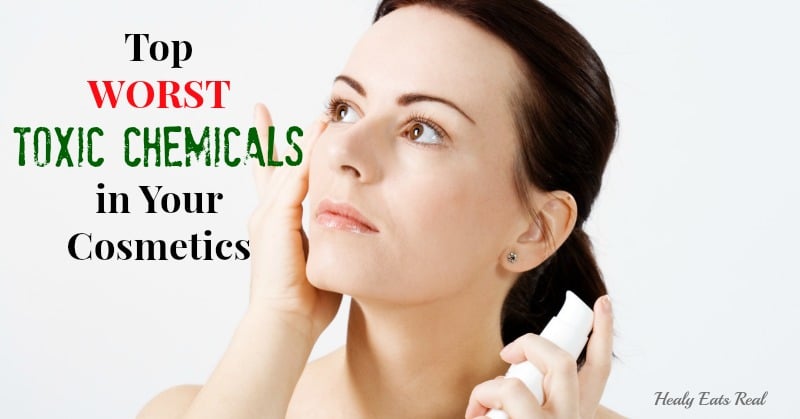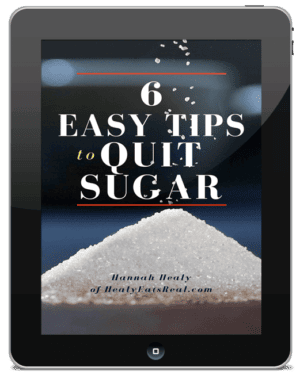WORST Toxic Chemicals in Cosmetics
This post may contain affiliate links. As an Amazon Associate I earn from qualifying purchases. Please read the disclosure policy.
Did you know that your skin can absorb the products that are put on it and many of them can make their way into your bloodstream? Considering the amount of chemicals in the products we use every day, this is a scary thought! That’s why is is so important to know which toxic ingredients in cosmetics could be harmful to your health!

When you start to look at how the chemicals in our everyday products are linked to everything from hormonal imbalance to allergies and cancer, it’s no wonder that all of these issues are on the rise. In the list below you will see how each chemical listed is associated with one or more of these issues.
Before we dive into some of the nastiest chemicals to avoid, I want to make clear I will be including other things like deodorant, soap and toothpaste in with this article even though those items may not necessarily be considered “cosmetics”.
Without further ado, here are some (but not all) of the chemicals you should avoid in your cosmetic or personal care products:
Top Chemicals to AVOID in Your Cosmetics:
1. Parabens
Parabens are chemicals that are often used as preservatives.
Where they are commonly found:
- lotion
- sunscreen
- shampoo/conditioner
- eye makeup
- soaps/body wash
What to avoid on labels:
Ethylparaben, butylparaben, methylparaben, propylparaben and any other word containing paraben
How they affect us:
Parabens have been linked to hormonal disruption, allergies, reproductive and developmental defects.
What to Use Instead:
You can buy naturally made products at most health food stores, but they can be pricey. Luckily, making your own can be inexpensive and easy. Most of the products that contain parabens can be easily made at home with easy-to-get ingredients including essential oils. I make my own lotion/body butter with shea butter, coconut oil, almond oil, Melaleuca Alternifolia (tea tree oil) and Frankincense essential oil, which are both great essential oils for skin health. I make my own sunscreen with coconut oil (which has a natural spf of 4-6), zinc (spf 5-20) and carrot seed essential oil (spf 30-40). However, I only use Young Living essential oils since most other store-bought essential oils can also contain unlabeled chemical additives, synthetic fragrances, pesticide residue or solvents like hexane that can be absorbed into the skin.
2. Aluminum
Aluminum is usually included in most anti-perspirants as an anti-sweating agent. It acts as a plug for the sweat glands to temporarily inhibit sweat from reaching the skin. Aluminium colloidal colorants ‘lakes’ are used in lipsticks to combine with color pigments and make them insoluble. In toothpaste, aluminum is sometimes used for coloring and sometimes used as a mild abrasive to polish tooth enamel.
Where it is commonly found:
- Deodorant
- Lipstick
- Some whitening toothpastes
What to avoid on labels:
Aluminum Chlorohydrate, Aluminum Chloride, Sodium Alum, Sodium Aluminium Chlorohydroxy Lactate, Sodium Sesquichlorohydrex Pg, Aluminium Sulfate, Aluminum Bromohydrate, Anything with the word ‘Aluminum’ before it.
How it affects us:
Reproductive toxicity. One study showed that aluminum was linked to testicular toxicity, decreased sperm quality and reduced fertility in mice.
Aluminum especially in deodorants has been linked to breast cancer. Some studies have even found levels of aluminum in breast tissue.
What to Use Instead:
Make your own deodorant! I have a great recipe for homemade deodorant that works wonderfully! I’ve tried buying natural deodorants from the store and they never worked for me. I have sensitive skin, but I still need a strong deodorant and this recipe works great. See my deodorant recipe here.
You can buy organic lipstick or make your own here.
For toothpaste, I know many folks that make their own. However, it’s best not to use baking soda every day on teeth because it is very alkaline and everyday use can disrupt the acid/alkaline balance in our mouth which affects bacteria killing abilities (learn more here). I prefer to buy this toothpaste formulated with redmond clay and alternate that with baking soda scrub a couple times a week and thieves mouthwash (great for dental health!).
3. Sodium Laureth Sulfate
Sodium Laureth Sulfate is a detergent, emulsifier and surfactant used in countless cosmetics and cleaning products.
Where it is commonly found:
- Shampoo/Conditioner
- Hair dye
- Toothpaste
- Body wash
- Make-up
- Hand soap
- Laundry Detergent
- Bath Salts
What to avoid on labels: Sodium Laureth Sulfate, Sodium dodecyl sulfate, Sulfuric acid, monododecyl ester, sodium salt, Sodium salt sulfuric acid, Monododecyl ester sodium salt sulfuric acid. Ethylene oxide is often added to SLS.
How it affects us:
Sodium Laureth Sulfate has been linked in various studies to hormonal disruption, neurotoxicity, reproductive toxicity, organ toxicity and possibly cancer.
What to Use Instead:
I either buy natural non-toxic body products or make my own with natural ingredients and essential oils.
4. Synthetic Fragrances
So many of the products that we use on a day-to-day basis contain synthetic fragrances that are created in a lab with toxic chemicals. When you see “fragrance” on a label it can include up to 300 different chemicals and still only say “fragrance”!
Where it is commonly found:
- Perfumes/cologne
- scented body products
- body wash
- shampoo
- scrubs
- lotions
- make up
- air fresheners
- cleaning products
- laundry detergents
- scented candles
What to avoid on labels:
Fragrance
How it affects us:
Chemical fragrances have been linked to allergies, reproductive damage, hormonal disruption and sperm damage.
What to Use Instead:
It is actually pretty easy to make your own scented products with natural essential oils! You can even make your own perfume! I love using a essential oil blend from Young Living called Joy for my perfume, you can just mix it with a carrier oil like almond oil and rub it on your neck or wrists and it smells great without any toxic chemicals! I like to make simple cleaners with lemon or thieves essential oils and it even kills germs naturally! I’ve basically replaced all of the toxic cleaners and chemical body products in my home with homemade non-toxic products made with natural ingredients like castile soap, baking soda and essential oils…and I even save money on it too! I just use an essential oil diffuser to make my home smell nice and detoxify the air while improving my health instead of hurting it.
5. Triclosan
Triclosan is a pesticide commonly found in anti-bacterial hand soap. It is supposed to kill germs, but even the FDA has found no evidence of this. “For other consumer products, FDA has not received evidence that the triclosan provides an extra benefit to health. At this time, the agency does not have evidence that triclosan in antibacterial soaps and body washes provides any benefit over washing with regular soap and water.”
Where it is commonly found:
- Antibacterial soap
- Toothpaste
- Deodorant
What to avoid on labels:
Triclosan, triclocarban, or anything “antibacterial” will usually have triclosan.
How it affects us:
Triclosan has been shown to impair muscle function and disrupt natural hormone levels.
What to Use Instead:
For soap, I like to use plain old castile soap or to attack bacteria I use Young Living Thieves hand soap which contains essential oils that may help with bacteria and support the immune system. You can also just add thieves essential oil to unscented castile soap for the same benefits. I also like thieves toothpaste for the same reason. You can also make your own toothpaste with baking soda and essential oils like peppermint or thieves.
Sources:
https://www.foodallergy.org/facts-and-stats
https://www.cnn.com/2014/02/04/health/who-world-cancer-report/
https://www.cdc.gov/nchs/fastats/infertility.htm
https://www.ncbi.nlm.nih.gov/pubmed/25584915
https://www.ncbi.nlm.nih.gov/pubmed/24652746
https://www.ncbi.nlm.nih.gov/pubmed/24652746
https://www.ncbi.nlm.nih.gov/pubmed/25128701
https://www.ncbi.nlm.nih.gov/pubmed/14745841
https://www.ncbi.nlm.nih.gov/pubmed/7601326
https://www.ncbi.nlm.nih.gov/pubmed/21337589
https://www.ncbi.nlm.nih.gov/pubmed/16045991
https://www.atsdr.cdc.gov/PHS/PHS.asp?id=953&tid=199
https://www.ncbi.nlm.nih.gov/pubmed/8780078
https://www.fda.gov/ForConsumers/ConsumerUpdates/ucm205999.htm
https://www.smithsonianmag.com/science-nature/triclosan-a-chemical-used-in-antibacterial-soaps-is-found-to-impair-muscle-function-22127536/?no-ist=
https://www.sciencedirect.com/science/article/pii/S0166445X06003407


